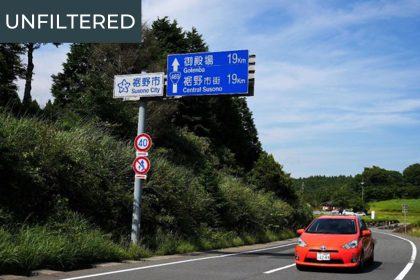With foreign residents in Japan reaching record numbers, our editorial team thought it would be a good time to reminisce about our halcyon days in Tokyo and share a few things that we’ve learned during our time here. Representing the U.S., France, and Belgium, we have a combined experience of nearly 30 years of living and working in Japan. We hope the following tips will prove useful for those of you who are putting down roots in Japan or thinking about doing so in the near future.
Tokyo: a City of Cities

Amelie: This may sound obvious, but a good thing to consider before you move to Japan would be where you want to live. I’m not just talking about which city, but where you want to live within the city of your choice. This is especially important if you plan to live in Tokyo.
If you haven’t been to Tokyo yet, it might be a good idea to look into things like how much time it takes to get to the places you’re interested in and how long your commute to work will be. This is something that’s going to make your life more comfortable here: saving time and being in a place that interests you. That changes everything.
David: That’s a good point and something I didn’t think about before I moved to Japan. So when I was looking for a place to stay. I was first offered a place that was quite far from Shinjuku. I was told it was only 30 or 40 minutes away, which was reasonable for most Japanese Tokyo residents. I kept refusing, though. The reason I came to Tokyo was to be close to certain places.
Eventually, I was offered another place in Kudanshita which, at the time, I thought would be perfect. After all, it’s the geographical center of Tokyo. So I took the place in Kudanshita, which as I now know, has nothing for me. It’s pretty dead in the evenings and on the weekends. So it’s good to know what neighborhoods match your lifestyle.
Anthony: I agree. Do your homework on your neighborhood. This ties into some of my general advice: before you move to Japan, travel here on vacation first. Research your city of choice, and find out where you’d like to live. Learn your commute times and what your ideal neighborhood is like.
Also keep in mind that, even within Tokyo, the amount of English that is spoken varies from neighborhood to neighborhood. For my first two years in Japan, I lived in Kamishakujii, about 30 minutes from Shinjuku. It wasn’t too far from Shinjuku, but it was kind of isolated and there wasn’t much to do there. At first, that was frustrating. However, I eventually realized that living there was great for improving my Japanese. I had more time to study. Additionally, a lot of the residents and shop owners either couldn’t or didn’t want to speak English. So I had to force myself to develop my ability to speak Japanese. Looking back, I’m glad I lived there for those two initial years.
David: For me, it was the opposite experience. Because I’ve always lived in the center of Tokyo, I always thought that’s where I should be. I’ve always lived in places where there is very little going on with regards to the community. So I’ve always been very isolated from neighbors and locals. These are places that are full of businesses—a very different experience from the suburbs.
Finding Your Community

Amelie: That brings me to my next topic. If you’re going to live in Japan, and you don’t know many people here, you have to prepare for the fact that during your first month or so you’re probably going to feel isolated.
In response to this, some foreign residents simply stick to people from their home country, while others will take the opposite approach and exclusively try to make Japanese friends. I think both of these approaches are wrong. You need people from your culture because when you get into bad situations, sometimes they are the only people who are going to really understand you, and it’s easier to be open with them. At the same time, you should try to meet Japanese people as well. You’re going to need a good balance. It can take a long time to make Japanese friends, so from my experience [as a French person], it’s very easy to make friends with French people. You will meet them once or twice and then you become friends. However, with Japanese people, it can sometimes take months before you can form good friendships.
So, again, you might feel isolated at first. If you’re feeling a little bit lonely, try to join a club or group activity because people tend to be more open in those situations. Also, don’t underestimate the power of the small izakaya [Japanese-style pub] in your neighborhood—the kind of place where there are only four or five seats. That’s another situation where people tend to open up a bit more. If you go there every week, people will remember you and you might make some new friends. Even if you’re not into alcohol, just go there, have a soft drink, and speak with a bartender and the people there. Even if you don’t know much Japanese, people will probably try to talk to you. And, if one place isn’t right for you, just find another one.

David: That’s true. One thing I did before I moved to Japan was to make a list of contacts beforehand. I asked everyone I knew in my home country that knew someone that lived in Tokyo. Then, when I arrived in Tokyo, I made sure to contact and meet them.
We would just go out for a coffee or for lunch and I would ask questions about Tokyo. Then, through these people I would get more contacts. You just want to keep yourself busy. When you first get to Japan, it’s bewildering. There’s a lot going and you can get very lonely. But if you have a list of people that you can meet, you’ll be able to get advice and make friends. Just keep yourself busy.
Anthony: Also, if you are career minded, make sure to find new professional circles. For example, if you come to Japan as an English teacher, it’s really easy to fall into the comfort zone of only networking with other teachers. For career growth, however, you should network with other communities—maybe the startup community, financial services community, or whatever. Not only will that broaden your horizons, but it will also automatically expose you to new people, and hopefully that will limit any loneliness you might feel.
Amelie: What kind of tips would you give to do this kind of networking? Because when you’re among English teachers, you only know other English teachers, so what can you do to meet new people?
Anthony: Great question. Meetup groups are good. Choose them carefully, though. Some are more professional than others. However, you can find Meetup groups in your field, whether that’s coding, design, or my personal favorite, marketing. Also, many countries have chambers of commerce in Tokyo that you can join. There are also independent networking events you can find on sites like Doorkeeper and Peatix. Business in Japan is a great place to start if you are interesting in meeting professionals from a variety of industries.
Overall, there are amazing professional communities out there, especially in major cities such as Tokyo, Osaka, Nagoya, and Fukuoka.
David: It’s surprising how many people from different backgrounds come to Tokyo for various reasons. After all, it’s one of the biggest cities in the world.
Anthony: Yeah, Tokyo is more international than most people realize. Indeed Japan is infamous for its small foreign population, but if you look at Tokyo, there’s an incredible international business community here. I meet more people from all over the world than I ever did when I lived in California—and that’s a pretty diverse place.
One Size Doesn’t Fit All
Anthony: So what other advice do you have for those who plan to live in Japan?
David: Well, this advice is very specific to me, but just make sure you bring any large-size items of clothing you might need.
Amelie: I agree. By Japanese standards, I’m quite tall: 170 centimeters. For Europe, that’s not so tall, but I’m taller than most women here. Sometimes I have trouble buying shirts—the sleeves are often too short for me. So if you want to buy something from Japanese shops and from Japanese brands, make sure to try them on first.
However, things are getting better these days because now there are lots of European brands and even UNIQLO has a large variety of sizes. But sometimes you still might have trouble finding something in your size, especially shoes. If you are a woman with big feet, shopping online might be a solution.
So, make sure to bring enough essential clothing items that will last until you get settled in and learn where you can find clothes that fit you.
Patience Is a Virtue

Anthony: Let me bring up one more topic: important personality traits. If you’re not patient already, you should try to develop or learn that personality trait. I don’t mean this in a negative way. There’s just a lot of instances in Japan where you have to follow a precise process—you have to jump through hoops upon hoops. You just need to go through the motions, and if you complain or try to do things differently, it’s not going to help. Instead, you’ll just make things worse, and you don’t want to be someone that’s hard to deal with.
I don’t know if it’s like this anymore, but when I first moved to Tokyo, it took nearly three months just to get an Internet connection in my apartment. And there was absolutely nothing that I could have done about that. Another example: to open a bank account, you are most likely going to need a hanko (personal stamp/seal), which must be custom made for most foreigners, essentially making the process of opening a bank account last for days. For Americans, getting a driver’s license is also quite an ordeal. Basically for anything significant you have to do, there are a laundry list of specific procedures that you need to diligently go through. But, if you are patient, and know what to expect, none of this will stress you out too much.
Amelie: Yes, you have to be patient about a lot of things here. In business, you will soon realize that certain things will take much more time than what you are used to. You’ll need to go through countless meetings before a decision is made. Or you’re going to have to meet customers over and over before a project can move forward. This is similar to how, as we discussed before, friendship works. Everything takes time and you need to realize and prepare for that. If you know this, the situation is actually less frustrating. Don’t take it personally. It’s just how things work here. As Anthony said, don’t be pushy and try to change the process because it won’t change and you’ll just end up frustrated.
Anthony: And that will just harm your reputation.
David: Thankfully, these days, there are a lot more resources [in English] on the Internet where you can learn these processes for various things. When I had to renew my driver’s license, I knew it was going to be frustrating. I knew that everything would be obscure and I would get impatient. But, thankfully, I was able to look up a detailed account of what to expect—where to go, what to ask, what would happen, and so on. I just kept the info on my phone as I went through the process. When I knew exactly what to expect, I was fine. It actually turned out to be quite a nice process.
Anthony: Both of you shared some excellent advice to wrap up with. Anticipate what might happen, do some research, and if you set your expectations properly, you won’t be frustrated.
David: And, if you do have a unique experience of your own, don’t forget to share it!




